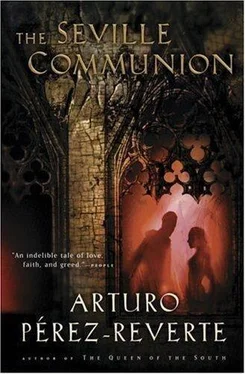Arturo Perez-Reverte - The Seville Communion
Здесь есть возможность читать онлайн «Arturo Perez-Reverte - The Seville Communion» весь текст электронной книги совершенно бесплатно (целиком полную версию без сокращений). В некоторых случаях можно слушать аудио, скачать через торрент в формате fb2 и присутствует краткое содержание. Жанр: Исторический детектив, на английском языке. Описание произведения, (предисловие) а так же отзывы посетителей доступны на портале библиотеки ЛибКат.
- Название:The Seville Communion
- Автор:
- Жанр:
- Год:неизвестен
- ISBN:нет данных
- Рейтинг книги:4 / 5. Голосов: 1
-
Избранное:Добавить в избранное
- Отзывы:
-
Ваша оценка:
- 80
- 1
- 2
- 3
- 4
- 5
The Seville Communion: краткое содержание, описание и аннотация
Предлагаем к чтению аннотацию, описание, краткое содержание или предисловие (зависит от того, что написал сам автор книги «The Seville Communion»). Если вы не нашли необходимую информацию о книге — напишите в комментариях, мы постараемся отыскать её.
The Seville Communion — читать онлайн бесплатно полную книгу (весь текст) целиком
Ниже представлен текст книги, разбитый по страницам. Система сохранения места последней прочитанной страницы, позволяет с удобством читать онлайн бесплатно книгу «The Seville Communion», без необходимости каждый раз заново искать на чём Вы остановились. Поставьте закладку, и сможете в любой момент перейти на страницу, на которой закончили чтение.
Интервал:
Закладка:
The guard stiffened and held his halberd straight, not so much at the greeting – in perfect German – as at the sight of the letters IEA in the upper right-hand corner of the man's identity card, next to the tiara and the keys of St. Peter. The Institute of External Affairs was entered in the thick red volume of the Pontifical Yearbook as a department of the secretariat of state. But even the newest recruits to the Swiss Guard knew that for two centuries the Institute had been the executive arm of the Holy Office and now co-ordinated all the secret activities of the Information Services of the Vatican. Members of the Curia, masters of the art of euphemism, referred to it as God's Left Hand. Others called it the Dirty Work Department, but only in a whisper.
"Kommen Sie herein"
"Danke."
Quart walked past the sentry through the ancient Portone di Bronzo and turned right. He came to the wide staircase of the Scala Rcgia and, after stopping at the checkpoint, mounted the echoing marble steps two at a time. At the top, beyond glass doors guarded by another sentry, was the Courtyard of St. Damaso. He crossed it in the rain, watched by yet more sentries in blue capes. There was a sentry at every door of the Vatican palace. After another short flight of steps Quart stopped outside a door with a discreet metal plate: ISTITUTO PER LE OPERE ESTERIORE. He took a tissue from his pocket and dried the rain from his face, then bent down and wiped his shoes. He screwed the handkerchief into a ball and threw it into a brass ashtray by the door. At last, after checking his shirt-cuffs and smoothing his jacket, he rang the bell. Lorenzo Quart was perfectly aware of his failings as a priest: he knew he lacked charity and compassion, for instance. And humility, despite his self-discipline. He may have been without these qualities, but he was thorough and adhered strictly to the rules. This made him valuable to his superiors. The men waiting behind the door knew that Father Quart was as precise and reliable as a Swiss Army knife.
The room was in semidarkness. There was a power cut in the building and the only light – from a window facing the Belvedere Gardens -
was dim and grey. A secretary left, closing the door behind him, as Quart entered and stood in the middle of the room. Quart knew the room well. Its walls were lined with bookshelves and wooden filing cabinets partly covering frescoes of the Adriatic, Tyrrhenian, and Ionian seas by Antonio Danti. Ignoring the figure standing at the window, he nodded briefly to a man sitting at a large desk covered with files.
"Monsignor," he said.
Without a word, Archbishop Paolo Spada, director of the Institute of External Affairs, smiled at him conspiratorially. He was from Lombardy, a strong, solid, almost square man, with powerful shoulders beneath a black suit that bore no emblem of his ecclesiastical rank. With his large head and thick neck, he resembled a truck driver or boxer, or – perhaps more appropriately in Rome – a veteran gladiator who had exchanged his sword and helmet for a priest's habit. This impression was reinforced by his black, bristly hair and huge hands, with no sign of an archbishop's ring. He held a brass paperknife shaped like a dagger and waved it in the direction of the man at the window.
"I assume you know Cardinal Iwaszkiewicz."
Only then did Quart look to his right and greet the motionless figure. Of course he knew him. His Eminence Jerzy Iwaszkiewicz, Bishop of Krakow, promoted to cardinal by his compatriot Pope Wojtyla, and Prefect of the Sacred Congregation for the Doctrine of the Faith, known until 1965 as the Holy Office, or Inquisition. Even as a thin dark shadow at the window, Iwaszkiewicz and what he represented were unmistakable.
"Laudeatur Jesus Christus, Eminence."
The director of the Holy Office remained silent. It was Monsignor Spada's husky voice that intervened. "You may sit if you wish, Father Quart. This is an unofficial meeting. His Eminence prefers to remain standing."
He'd used ufficioso for "unofficial", and Quart caught the nuance. In Vatican parlance, there was an important distinction to be made between ufficioso and ujficiale. Ufficioso conveyed the special sense of what is thought rather than said, or even, what is said but always disowned. Quart glanced at the chair the archbishop had indicated, and gently shook his head. He clasped his hands behind his back and stood in the centre of the room, calm and relaxed, like a soldier awaiting orders.
Monsignor Spada regarded him approvingly. The whites of the archbishop's small cunning eyes were streaked with brown like those of an old dog. This, together with his solid appearance and bristly hair, had earned him a nickname – the Mastiff. But only the most high-ranking, secure members of the Curia dared use it.
"Pleased to sec you again, Father Quart. It's been some time."
Two months, thought Quart. Then, as now, there had been three men in the room: himself, Monsignor Spada, and a well-known banker, Renzo Lupara, chairman of the Italian Continental Bank, one of the banks involved with Vatican finances. Lupara had an untarnished reputation. He was handsome, elegant, and a happy family man blessed with a beautiful wife and four children. He had made his fortune using the cover of Vatican banking activities to get money out of the country illegally for businessmen and politicians who were members of the Aurora 7 lodge, of which he himself was a member and holder of the 33rd degree. This was exactly the sort of worldly matter that required Lorenzo Quart's special skills. He spent six months trailing Lupara through offices in Zurich, Gibraltar, and St. Barthelemy in the West Indies, and produced a lengthy report on his findings. Lying open on the desk of the director of the IEA it left the banker two choices: he could go to prison, or he could make a discreet exit, thus saving the good name of the Continental Bank and the Vatican, not to mention Mrs Lupara and her four offspring. Staring blankly at the fresco of the Tyrrhenian Sea in the archbishop's office, the banker had clearly grasped the thrust of Spada's speech, which was most tactfully expressed and illustrated with the parable of the bad slave and the talents. Then, despite the salutary moral that, technically, an unrepentant mason always died in mortal sin, Lupara went straight to his beautiful villa in Capri and leaped, apparently without saying confession, from a terrace over the cliff. According to a commemorative plaque, Curzio Malaparte had once drunk vermouth at that very spot.
Читать дальшеИнтервал:
Закладка:
Похожие книги на «The Seville Communion»
Представляем Вашему вниманию похожие книги на «The Seville Communion» списком для выбора. Мы отобрали схожую по названию и смыслу литературу в надежде предоставить читателям больше вариантов отыскать новые, интересные, ещё непрочитанные произведения.
Обсуждение, отзывы о книге «The Seville Communion» и просто собственные мнения читателей. Оставьте ваши комментарии, напишите, что Вы думаете о произведении, его смысле или главных героях. Укажите что конкретно понравилось, а что нет, и почему Вы так считаете.












